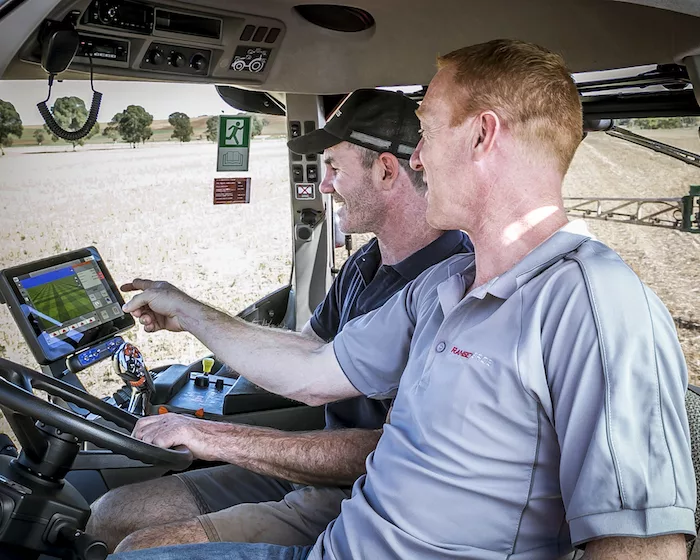For a dealership in southern Australia, being on the cutting edge of precision agriculture is quite different than in the states — however, many of the same principals are at work.
Michael Hadley, a precision ag consultant for Ramsey Brothers, believes in making the extra effort to ensure that the 6 store Case IH dealership group in Australia is a market leader. This means broadening his sales scope while actively chasing new and advanced equipment at the same time.
Non-Traditional Customers
Hadley estimates that 90% of the dealership’s precision business comes from farmer’s working what he calls “broad acres.” These farmers are analogous to large-scale row-crop farmers in the U.S. However, he’s spotted potential in chasing after alternative markets. The volume of customers may be smaller, but if the competition isn’t pursuing those markets, they’re easier to corner.
“The company name that we’ve created for the precision farming end is Ramsey Brothers Integrated Technologies because we don’t want to focus on agricultural farming alone,” he says. “We’re after agriculture, horticulture and even aquaculture. We have had an inquiry about installing modems out on the tuna farms.”
Non-traditional markets local to Ramsey Brothers are still demanding technology in order to do their work more efficiently, but Hadley says that his team just needs to focus on what that means from a practical perspective.
“We have a fair number of vineyards and olive growers,” he notes. “In the integrated technology side of it, we see vineyards as a great potential customer for us because you can have RTK networks, weather stations, implement control and ISOBUS for them. We’re looking at steering too, for their harvesters, not their tractors. There are just so many ways you can go in the vineyards and we see it as a market in our area that nobody is considering because it’s too much work.”
He sees the same potential for local veggie farmers and other horticulturists.
Tailoring to Customers’ Needs
Smaller, more specialized farmers might not be able to make large investments in equipment, but even bigger farmers have limitations. Although the bulk of Hadley’s customer base are already seeing the returns precision equipment investments can bring, there is still the issue of getting them to upgrade.
“At the moment, we’ve got an issue with old technology on our Eyre Peninsula branches because they’ve been using precision equipment the longest,” says Hadley. “We’re at a stage where we’re not stuck, but getting customers out of old technology is difficult. We sold them an RTK system 10 years ago that cost $50,000. Telling them that they need an upgrade it at a cost of $20,000-$40,000 is hard.”
However, in both instances, the momentum gained by demonstrating the value of precision equipment to farmers, no matter their crop, feeds itself.
“I’ve found technology and accuracy is addictive,” says Hadley. “You’ll have a customer that might have RTK on their seeder, and it doesn’t take them very long to say ‘I’m going to have to put it on my sprayer now.’”
In addition to accuracy, he says this is the case for convenience as well.
“It’s not just for technology, it’s also ‘I don’t want to lean forward and press the button, I want a foot pedal or a joystick to control everything,’” says Hadley. “We’re also hearing ‘I don’t want to use the switches, I want to do it all automatically.’”
What works best for the farmer, in terms of precision equipment, is subject to frequent change, Hadley finds. For instance, he recalls a push about 5 years ago to have all equipment and controls run through an interface on one display to reduce cab clutter, but on the practical end, the trend seems to be changing.
“You’d have your one screen for steering, spraying, spreading and all cameras,” he says. “Now it seems to be that farmers want two screens — one for steering and one for ISOBUS or a spray controller. That’s something that has done a full loop. But the manufactures are saying that because the tractors are coming out with screens pre-installed, they’re not selling an aftermarket screen.”
Crystal Ball Gazing
Being forward thinking takes deliberate effort. Ramsey Brothers is making an investment in manpower to ensure that they remain the most advanced provider in their market. They’re currently seeking to hire a replacement for Hadley at their Riverton location so his efforts can be entirely focused on keeping the dealership “2 years ahead” of their competition.
“That’s the plan. If something comes out, we need to be there looking at it first,” he says. “We can be the ones bringing something back to Australia because it’s not in Australia. You just don’t know what’s going to come up in precision technology, so it’s hard to quantify that, but we just want to be the market leader.”
Hadley feels that by gaining a reputation for discovering, testing, using and selling the latest and greatest equipment on the precision equipment market, recognition among customers will follow.
“We want people to say, ‘Oh, I need something precision ag, let’s go to Ramsey Brothers,’” he says. “About 5 years ago, we got too comfortable and the competition caught up. We don’t want that to happen again. We need to be the ones bringing the newest technologies to our market.”




![[Technology Corner] A Big Step Forward for Interoperability & Data Sharing](https://www.precisionfarmingdealer.com/ext/resources/2025/12/12/A-Big-Step-Forward-for-Interoperability--Data-Sharing.webp?height=290&t=1765565632&width=400)


